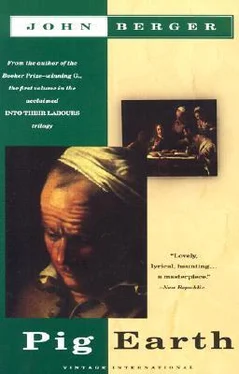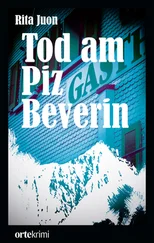At the foot of her husband’s grave, she said, “Only two or three bones are left.” Then she made the sign of the cross, not against her black coat, but over the ground into which he had been lowered.
At the foot of her father’s grave, which had no masonry but only a wooden cross, she said: “Ah my father, if you could see your daughter now.”
She did not hesitate to speak her thoughts out loud.
The cemetery, like everything else, was on a slope, and so she left by the top gate so that her climb home would be shorter. She carried a pot in each arm, the tousled blossoms, the tips of whose petals had gone brown with the frost, were level with her head on each side. She was a woman of seventy-five.
In the house she took off her black overcoat and put on an apron, a cardigan and a grey shawl over her head. “There’s still time!” she said to one of her goats, leading it out of the stable.
The goat ambled lightly along the path beside her in the forest. As Hélène walked her boots made a scuffing noise in the leaves, which in places were covered with frost like grey salt. She led the goat with a short rope, and in her other hand she carried a stick. After half an hour, she stopped under an oak tree and filled the large pocket of her apron with acorns.
“Jésus Marie!” she said to the goat. “Aren’t you ashamed? An old woman collecting acorns for you.”
The goat looked at her through the black oblong centres of its eyes. A few specks of snow, no larger than sawdust, fell between the trees.
“The great whiteness will soon cover us,” she said and tugged the rope.
“Sometimes I try to pray, but things come into my head and distract me. It’s my nature. My poor father told me the same thing. You’re always wanting to be in the oven and the flour mill at the same time, he said, and so you can’t keep your mind on anything. I’ll tell you what you are like, he said, you are like the man whose friend says to him, ‘I’ll give you my horse if you can say the Lord’s Prayer without thinking about anything else.’ And the man says, ‘Done.’ And he begins, ‘Our Father which art …’ ”
The old woman and the goat could hear the roar of the stream ahead. The stream was so full that its water frothed like milk.
“… and when the man gets half-way through the Lord’s Prayer he stops and says, ‘Can you give me the bridle for the horse too?’ ”
Everything was grey except for the rushing water and the white flecks of snow on the goat’s neck. The path left the forest and climbed between fields. The goat started walking faster, pulling the old woman along. She was the stronger of the two, but instead of checking the goat, she trotted behind. In one place the path was entirely covered with ice.
Cows place their feet with a certain delicacy as if wearing high-heeled shoes; goats, however, are like skaters. The goat danced on the ice and Hélène, letting go of the rope, gingerly felt her way round the edge, holding on to the grass bank. When she was on the other side of the ice, the goat refused to come towards her. She threatened and raised her stick. “It’s snowing,” she muttered, “it’s nearly night. As if all my losses aren’t enough, shit, shit, shit, you are playing me up.”
On some occasions anger made her cunning. When she let out her chickens and they began to pull up the flowers in her garden, she pretended she had grain in her hand for feeding them, and she clucked sweetly to attract them, until she could lay her hands on one: then she would shake it with both hands and its feathers would fall out and she would hurl it above her head as high as she could against the sky. And the chickens were so stupid they came one by one to get their punishment.
The goat, who was not stupid, stared at her as she waved her stick. “You good-for-nothing carcass of a goat!”
After a while the goat stepped off the ice and the pair of them continued on their way. The very desolation of the scene made them look like accomplices. The rockface rose up above them, sheer as a wall for three hundred and fifty metres. The massive pine trees at the top were just visible in the falling dusk, as small as sprigs of herbs.
Hélène led the goat towards the wall, at the same time calling. Her call was not unlike the noise she made to attract the chickens when she fed them. But it was a shriller and shorter call, punctuated with silence.
After several calls there was an answering one which no voice could have imitated. Perhaps an instrument like a bagpipe would come nearest to reproducing it. The lament of breath issuing from a skin bag. The Greeks called the cry of the he-goat tragos , from which they derived the word tragedy.
He was darker than the surrounding dusk and his four horns were entwined with each other, as can sometimes happen with the branches of a tree when the trunk has divided into two. His gait was unhurried.
Hélène hid her left hand in her right armpit to keep it warm. With her right hand she held the rope. The goat stood there waiting. The specks of snow were turning into large flakes. Since she was a child she had done the same thing when the first real flakes fell. She stuck out her tongue. The first snowflake prickled like sherbet on her seventy-five-year-old tongue.
The goat lifted her tail and began to wag it. It made a circular movement like a spoon stirring quickly. The he-goat licked beneath it. Then he straightened his neck and the corners of his lips curled back baring his mouth to the taste. His thin, red-tipped penis emerged from its tuft of hair. He stood as motionless as a boulder. And after a moment his penis retracted. Perhaps the occasion was too inauspicious even for him.
“Jésus, Marie and Joseph!” muttered Hélène. “Hurry, will you! My hands are getting frozen. It’s night.”
He sniffed and let the goat’s tail brush between his eyebrows.
If the snow fell all night, she would be unable to bring the goat again, and she would have one or two kids fewer to sell in the spring.
The he-goat stood there as if waiting for something to pass. In her impatience Hélène squatted down on her heels, the snow settling on her shawl, to look under his body to see whether all hope had gone. There was still a tip of red.
“If I turned my anger into power,” she muttered, “it would blow up that wall of rock. Hurry! Will you?”
The he-goat tapped the flank of the goat with one of his forelegs. Several times. Then he tapped her with his other leg on the other side. When she was in position, he mounted and entered her.
Nothing else anywhere under the wall of rockface was visibly moving except the snowflakes and his haunches. His movements were as rapid as the falling flakes were slow. After thirty thrusts, his entire body shook. Then his forelegs slid off her back.
Hélène pressed with all her weight on the centre of the goat’s back. This was to encourage the retention of the sperm. The pair set off down towards the village. They took a longer but wider path down, past the house where Arthaud lived.
Lloyse, Arthaud’s wife, was killed by a boulder which fell from the top of the rockface. They were both asleep in their bed. Where the boulder first hit the earth, it made a hole big enough to bury a horse in. Nevertheless the boulder continued to roll down the slope. Slowly. When it reached the house, it didn’t crash right through it. It just broke through one wall and crushed half the bed. Lloyse was killed outright and Arthaud woke up, unhurt, beside the boulder. This was twenty years ago. The boulder was too heavy to move. So, clearing the wood and rubble away, Arthaud built another room on the other side of the house and in this room he now slept.
When Hélène and the goat passed, there was a light in the window of this room and one side of the boulder was already glistening with snow.
Читать дальше












